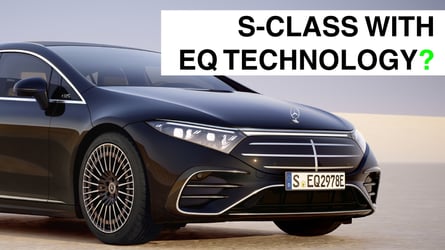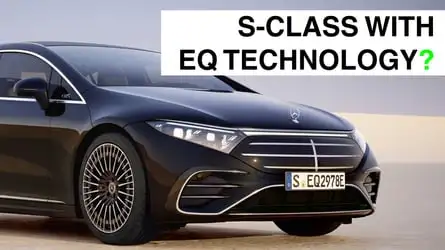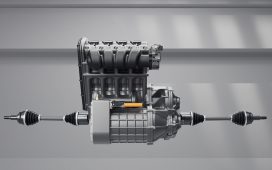Say goodbye, eventually, to the “EQE” and “EQS” naming scheme. Mercedes is sticking with the iconic names you know and love for future EVs.


Apr 24, 2024 at 8:12am ET
The folks at Mercedes-Benz won’t come out and directly say it, but they get that people aren’t really into the current “EQ” family of electric vehicles. Their ultra-smooth styling has proven extremely polarizing, sales have trailed rivals like BMW, and to top it off, there’s no way around the awkwardness of names like “AMG EQS SUV.” So for its next go at EVs, Mercedes is taking a different approach: keeping the “class” names people know and love, but appending the title “with EQ Technology,” just like on this new Mercedes-Benz G580 with EQ Technology.
We’ve known for over a year that Mercedes was planning to drop the dedicated “EQ” brand for electric vehicles. But we didn’t know what form the next step would take until Britta Seeger, the Mercedes AG board member for marketing and sales, confirmed the new strategy on a call with reporters ahead of the electric G-Class’ debut.
Mercedes’ rocky EV rollout
In the high-tech arms race toward the future of cars, Mercedes leads in some areas, like voice-controlled features. But in many ways it is trailing rivals like BMW who are making the electric transition with stronger sales, and the current crop of EQ-branded EVs have proven extremely polarizing. Will this new naming system keep things more familiar?
“This is the first car where we say, we’ll keep our product name and we concentrate on the technology which is inside,” Seeger said of that SUV. “To 99-point-something percent, you will see they’re equal, design-wise. This is why we’ve chosen to say this is a G-Class with EQ Technology. This will be, going forward, our nomenclature for those cars.”
She added that models “on the market” right now, like the EQE and recently redesigned EQS, will keep their current names. But she confirmed that upcoming models, such as the production version of the electric CLA Concept, would be called “CLA with EQ Technology” or something similar.
“Why did we choose [to do] so? Because we’ve seen that message the Mercedes customers they love to identify themselves with the classes we have,” she said, such as being an E-Class or S-Class owner. “We believe it’s the right point in time to stand with the G-Class name and concentrate on the technology that you find inside, and this will be the same for all future cars to come.”
Seeger added, “This is why we put, at the forefront, the classic Mercedes name of a class [like] C-Class, and then we concentrate on the technology.”
The move makes sense, and it tracks with a certain sentiment both inside the company and outside of it: that the current approach with the EQ cars isn’t exactly working.
At CES this year, Mercedes’ VP of car engineering Christoph Starzynski told Top Gear that those cars’ designs have put off traditional Benz buyers. And in a “fully electric” world, it was becoming a challenge to name all of their cars. (For the record, I am actually a fan of the EQE sedan, but I seem to be in the minority there.)
Gallery: Mercedes G580 With EQ Technology
85 Photos
Besides, names like S-Class, E-Class and G-Class have decades of brand equity that other rivals would kill for; why get rid of those just because the powertrains are different? It’s a bit like how BMW’s upcoming Neue Klasse platform is expected to keep the 3 Series and X3 names in some way. Automakers don’t want to throw those out when they dump gasoline.
Audi has had similar struggles, but instead is opting to make even-numbered cars like A4 and Q6 into EVs while keeping the odd-numbered ones combustion-powered. We’ll see how long that approach sticks around, because it’s arguably more confusing.
With any luck, then, the new G-Class with EQ Technology gives us a preview of what to expect from Mercedes in the coming years: cars much closer to the conventional ones everyone knows, just with batteries instead of engines—and maybe a bit more of a mouthful of a name.
Contact the author: patrick.george@insideevs.com









